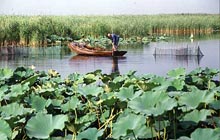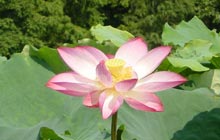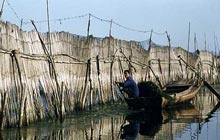
Two hours from Beijing, Baiyangdian in summer metamorphoses from a drab swamp into a colorful checkerboard of lotus patches and fish nurseries

The sun may have taken the weather forecasters by surprise, but not the lotus flowers. Attuned to the barest climatic fluctuation, they are already on the threshold of their summer bloom.
A gathering tide of flowering lotuses is now sweeping across China, transforming seemingly destitute marshlands into scenic tableaux of white, pink and yellow. Fortunately, Beijing residents do not need to journey far to treat themselves to Nature's floral coronation. For only 150 kilometres south west of the capital, bending under a gentle breeze, sway thousands of blossoming water lilies and lotuses.
Baiyangdian is a wetland area on the central plain of Hebei province. In the summer, as its name implies, it metamorphoses from a drab swamp into a "white ocean of lakes". This 360 square kilometre marsh, criss-crossed by thousands of rivers and ditches, comes alive in a colorful checkerboard of water-based nurseries. Only the local fishermen know their way through the maze of tall reeds to the oases of lotuses and water lilies concealed within.
 Gliding in a wooden punt through this sea of flowers, the sun's breath on your cheek, a hand trailing languidly in the cool, mirror-like water, your thoughts may wander from workaday to spiritual concerns. Such a reaction would be in keeping with the ancient symbolism of the lotus; it was Buddha, in similarly idyllic circumstances, who compared its growth with a person's path to Enlightenment–from lowly, sightless incipience to elevated, all-seeing maturity.
Gliding in a wooden punt through this sea of flowers, the sun's breath on your cheek, a hand trailing languidly in the cool, mirror-like water, your thoughts may wander from workaday to spiritual concerns. Such a reaction would be in keeping with the ancient symbolism of the lotus; it was Buddha, in similarly idyllic circumstances, who compared its growth with a person's path to Enlightenment–from lowly, sightless incipience to elevated, all-seeing maturity.
This is not to suggest that Baiyangdian affords nothing more than exquisite panoramas. Apart from the cultivation of shrimp, crabs, ducks and fish, enclosed within picturesque bamboo and net boundaries, you might want to observe the cormorant fishing here. Although the best time to do this is at dawn, when the fishermen hunt in packs, late in the afternoon you can still come upon isolated groups. On spotting a shoal of fish, the boatmen beat the water with their oars. This throws the shoal into agitated confusion and prompts the cormorant birds to give chase. Thanks to their heavy bones and lungs' small gas cells, these birds are able to dive swiftly underwater after the scattering fish. Having trapped their prey inside capacious gullets, they return them to their owners in exchange for well-deserved rewards.
While the menfolk earn their living on the water, the village women are busily engaged in a land-based cottage industry. In the village of Xilidi, women of all ages sit in the shade of a weeping willow weaving reed mats. Once the long reeds have dried in the sun, girls split them length-wise with a sharp blade. The resulting strands are passed to their mothers and elder sisters, some of whom can weave as many as two large mats a day. From the flower-lined lake shore, these mats make their way to the granaries of the north east, whence we came.
It was indeed in Xilidi that our group was privileged to receive a hearty welcome. We foreigners were overwhelmed by scores of friendly villagers eagerly offering their local delicacy — shrimp biscuits. Although relishing our first mouthful of these deep-fried, shrimp, our hosts' zealous hospitality soon all but destroyed our appetite for them. Only on condition that we accepted three rods of sugar cane and several plastic bags of lotus seeds did the villagers eventually accede to our departure. As they stood on the lake bank, waving us off, I felt quite embarrassed by their unreserved generosity.
In few places is the paradox of progress better presented than at Baiyangdian. For just as Buddhists today marvel at its wealth of lotuses so, in the past, have Mammonists salivated at its abundance of subterranean crude oil. Unlike monks however, bankers tend to discount the environment. So intense was their quarry for black gold here, that this wetland's pristine beauty was nearly forsaken for it. Many fishermen only maintained their livelihood and cormorants by relocating to China's southern provinces.
 Twenty years later, the oil-men are but a sorry memory. The fishermen have returned and the lake restored to its pristine splendor. Nonetheless, the Mammonist streak lurks in mitigated form. It is heard in the tinny jingle of a fair ground installed on one central island or spied in the crenellated outline of a nearby mini-theme park.
Twenty years later, the oil-men are but a sorry memory. The fishermen have returned and the lake restored to its pristine splendor. Nonetheless, the Mammonist streak lurks in mitigated form. It is heard in the tinny jingle of a fair ground installed on one central island or spied in the crenellated outline of a nearby mini-theme park.
Families may well appreciate such distractions. For those that don't, Baiyangdian is still large enough to harbor many tranquil alternatives. Enjoy at your leisure the innate wealth of its welcoming inhabitants and inspiring beauty.
Take the two hour train ride from Beijing to Baoding. A bus to Anxin leaves from Baoding train station. However, since this is infrequent you might negotiate with a taxi driver to complete the 40 km journey. At Anxin's port, there is no shortage of fishermen eager to hire themselves out. We paid ¥300 for a day's boating, but this could probably be reduced.
On the lake, travelers should ask their boatman to take them to the Dongfang hotel, run by Mr Xia Jiabin (Tel – 0312 5239105). This is on its own island within the precincts of the village of Quantou. Mr Xia charges ¥60 for a fairly basic double room with a fan but no bathroom. Since he's only got five such rooms, it's probably best to phone ahead. Although facilities are wanting, the hotel's location is unsurpassable. Its drive is a narrow canal, cut straight as a Roman road through endless stretches of reeds. Alternatively, you could stay at Anxin at the Anxin Hotel.
July 20-August 2, 2000 CITY WEEKEND